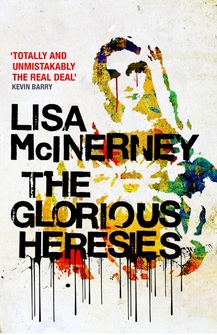
We know about the darkness of Catholic Ireland here on Annecdotal from our discussion of John Boyne’s dissection of cover-ups in the priesthood in his novel, A History of Loneliness, last year. But interestingly, rampant paedophilia is the one vice Lisa McInerney doesn’t address in her audacious debut novel exploring the murky underbelly of Ireland’s post-crash society. The Glorious Heresies kicks off with a murder in the ground floor apartment of the decommissioned brothel in which the gangster, Jimmy Phelan, has installed his long-lost mother. But this is no police procedural – the reader knows early on whodunnit to whom – but the murder of Robbie O’Donovan is the device through which Lisa McInerney weaves the lives of her misfit characters over the ensuing five years.
I found the tangle of characters a little confusing initially, but the quality of the writing and the psychological depth behind the characters’ facades, soon pulled me in. While none of the people I met between these pages are particularly likeable, they all have a moral side, however slim. Even the fearsome Jimmy Phelan feels an obligation to do right by his old mammy. The younger characters, like Ryan and Georgie, totter on a tightrope between redemption and iniquity, so that you can’t help hoping they’ll turn out all right.
Throughout the novel there’s an undercurrent of rage at a society that turns a blind eye to the cruelties perpetrated on the vulnerable: from Ryan shouting at a couple who use a four-year-old child to steal to the teachers who pay attention to his defacing a desk but ignore his black eye; from the failure of the police to fully investigate Jimmy Phelan’s excesses to the dangers faced by Georgie on the streets (p98):
You could never be safe, even though you’d be so careful and smart, leaning in through car windows to slyly sniff their breath for signs of riled drunkenness, reading the tics and faces pulled to gauge violent intent. A few would always get through, and the ones you couldn’t interpret where the worst of the lot, the real evil bastards, the ones who hid behind stony faces the rage, the frustration, the deep-seated mammy issues they were only dying to take out on you. You, the dirty whore. You, representing in living, breathing audacity everything that was wrong with them.
Part of the difficulty for the powerless is that they’ve been knocked down so many times, the good things that come their way seem alien, “fragments of someone else’s bedtime story” (p99), unlikely to endure.
At the core lies the Catholic Church and the women, abused and abusing, colluding in the denigration of their sex, like Maureen’s brainwashed mother who “pandered to the vestments as if by debasing herself she could avoid the stain of her sex” (p186). It’s Maureen, banished from the country for the crime of pregnancy forty years previously and a little unhinged, who most clearly articulates the heart of the hypocrisy (p252):
The Church craves power above all things, power above all of the living. The Church has an ideal and it’ll raze all in its way to achieve it. The Church needs its blind devout … The Church creates its sinners so it has something to save.
For more musings on this novel, see my Q&A with the author, Lisa McInerney. Thanks to John Murray for my review copy.





















 RSS Feed
RSS Feed





















